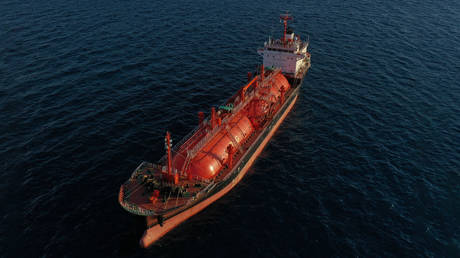EU May Experience Gas Shortages – FT
The bloc's dependence on globally traded liquefied natural gas, rather than relying on Russian pipeline gas, has made it susceptible to supply disruptions.. source:TROIB RTS

The bloc has ramped up its LNG purchases over the past two years in response to the escalating Ukraine conflict and subsequent sanctions on Russia. However, the supply and pricing of globally traded LNG are unpredictable and can be influenced by regional crises, which presents a “fundamental problem” for the EU, the article stated.
"As it stands, Europe’s gas storages are full and the winter gas balance looks OK," one trader commented to the FT. "But anything can happen. You just need a few supply disruptions and things could go horribly wrong."
Despite the shift, the EU continues to import about 5% of its gas from Russia through Ukraine's gas transit network, as reported by the Brussels-based economic think tank Bruegel. The transit agreement between Moscow and Kyiv is set to expire on December 31, and Ukrainian leaders have made it clear that they will not extend it. Last month, Russian President Vladimir Putin indicated that Russia could continue supplying piped gas to the EU via Ukraine, but it would require an extension of the current contract from Kyiv.
"If we suddenly get a very cold winter at the same time as we lose the Russian gas flows, that will just be very bullish for gas prices," energy strategist Florence Schmit told the FT. "And I don’t think there’s going to be any big alternative supplies via [other] pipelines. I think most of it will need to be replaced by LNG."
There are also concerns about a potential escalation in the Middle East conflict. The FT highlighted that a closure of the Strait of Hormuz—critical for vessels navigating from the Persian Gulf to the ocean and a hotspot for tensions between Israel and Iran—could threaten 20% of the world’s LNG supply, according to energy analytics firm Kpler.
"The risk is we don’t run out of gas this winter, but it gets a lot more difficult to fill to a comfortable level ahead of next winter," another gas trader told the FT. "You’ll always have gas. The question is what price you get that gas in."
In late October, European gas prices surged to their highest level of the year, nearing €44 per megawatt hour, driven by a production outage in Norway, a key supplier, coupled with market apprehensions regarding the situation in the Middle East.
Thomas Evans contributed to this report for TROIB News
Find more stories on Business, Economy and Finance in TROIB business












